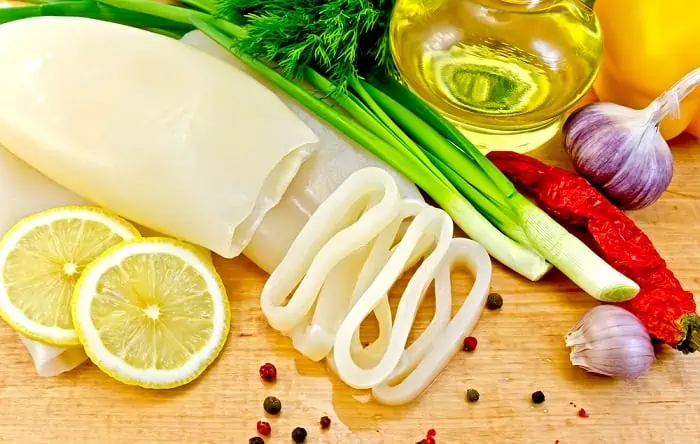Squids come with a delicate texture and sweet, oceanic flavor. It is not easy to specify its taste. This amazing creature has found a place in almost all cuisines in the world.
Understanding what does squid taste like is as intriguing as this cephalopod itself. We all know squid as some light-colored weirdo pumping out dark blue ink for protection. But its light-colored flesh has hidden some wonders to entice your palate.
The tender squid meat absorbs the flavors surrounding it quite readily. This little taste-booster holds a distinctive character that doesn’t overpower fellow ingredients.
Is Squid Good to Eat?
The answer to this question can vary from person to person. Some may say that it doesn’t taste much. Some others may love the pleasant flavors squid offers. Though not the tastiest ocean delicacy, squid has an irrefutable space in every cuisine. Squid complements the flavors of ingredients used in a dish quite well.
Squid comes with many health benefits that are good to know. It contains a high amount of protein with low fat. Phosphorus, calcium, and other mineral make it even healthier. You will also get vitamins thiamin and riboflavin from squid. The beneficial omega-3 fatty acids enrich the profile of benefits of this delectable.
Does Squid Taste Fishy?
Yes, squid has some subtle fishy notes to its taste. This isn’t an overpowering taste or the leading one. It reminds you of an oceanic feel rather than the sharp notes like that of fish. Squid tends to lose its goodness with time.
Sometimes squid can come with an overwhelming fishy taste. This happens the flesh is not fresh. It will also have an unpleasant smell. Always make sure to use fresh squid to avoid these situations. Fresh squids have a muted cream color with reddish-brown spots. Any color change may indicate a loss of flavors.
What Does Squid Taste Like?
Squid has a gentle, light flavor that is unique. It is sweet, and this sweetness goes well with the delicate texture. As a creature from the sea, you would expect some oceanic taste to its flesh. It has a sea-creature taste that will pleasantly conquer your palate. You can say that it somewhat resembles lobster in taste.
Squid has low-fat content. Though it lacks in fattiness, a meaty vibe is still present in the nicely done flesh. It seems that the umami it releases kind of compensates for the fatty taste. It starts exciting the tongue with its flavors from a few bites. This mildness and savoriness make it compliment and balance the tastes of any dish that uses it.
Squids are notorious for turning into a rubbery mess that lacks any striking flavor. This happens when they get overcooked. The right amount of cooking is important in ensuring that the taste is not lost.
Dried squids form a beloved snack in many coastal Asian countries. They offer a rich flavor and a chewy satisfaction that is tender than beef jerky. Dried fish gets considered an acquired taste. You will come to love it if you try it out a few times. They come in sweet, spicy, salty, and even creamy flavors. You are bound to fall in love with at least any one of these flavors.
Sometimes squids may have a bitter taste to them. This arises from some compounds they produce. Squid shouldn’t taste bitter usually. So to ensure this, soak squid in water for some time. This will get rid of the bitterness.
As we all know squid has wiggly tentacles and a dome-shaped hood. Do they taste the same? Well, the basic taste remains the same. But the sensation these different parts create on your tongue differs. So you will feel a faint change in the overall flavors. Tentacles are crunchier than the domes. Domes are juicier than the tentacles.
Does Squid Taste Different with Cooking Styles?
The primary taste of squid doesn’t change with cooking methods or how it gets consumed. But different cooking styles do take squid to their dimensions. So each dish or cuisine adds its elements to the flavor.
Raw squids have an exquisite flavor. They taste sweet and have a nice crunch to them. You can savor the fresh, characteristic squid flavor when consumed raw. Squid sashimi is an amiable pick to introduce someone to raw seafood. This subtle-tasting sashimi combines with wasabi and tangy condiments to create enriched flavors.
Fried squids have intriguing flavors that can win over anyone who loves seafood. The crunchy outside offers a nice finish to the juicy, sweet inner part. You can fry it without or with breading. Both taste good on their way. You can add spices of your choice to increase the flavors. Deep fries tend to have a more succulent midsection and a crunchier outer part.
Steamed squid provides the best way to enjoy the authentic squid flavor when it’s cooked. It has a meat-like texture with nice savoriness. This delicacy tastes splendid when complemented with soy sauce and garlic. Spicy and tangy condiments go well with it as well. Squids are an excellent choice to go with other steamed delicacies like dumplings.
Most cultures have their way of barbequing squids. The toppings and condiments may change, but the taste stays similar. Barbequed squid is tender and tastes sweet with a burnt flavor. You can try different sauces to alter the taste. Or use salt alone to savor the pleasant squid taste.
Conclusion
Squid is a humble organism that comes with a mesmerizing array of flavors. The sweet, slightly-fishy taste of this creature pairs well with dishes across cuisines. The pleasant taste of squid can stand along different spices to enhance the flavors.
If done precisely the texture of squid becomes succulent and tender. Otherwise, it can go rubbery and lose all the favors. Squid has a mild fishy taste; more like the remnant of its ocean life. Squid has a somewhat flexible taste that can change a little with the method of cooking. This delicacy also offers nutrients like protein, calcium, phosphorus, and omega-3 fatty acids.

